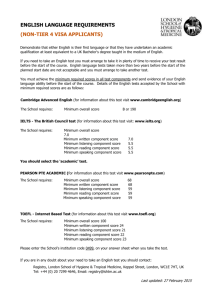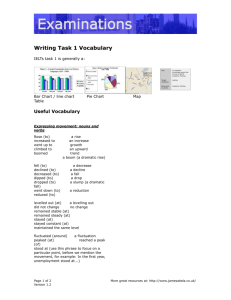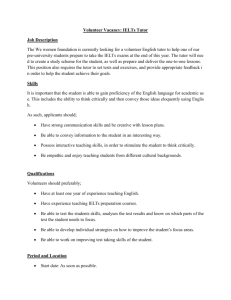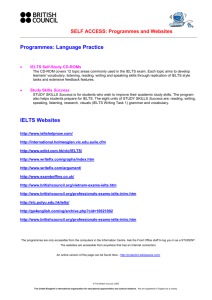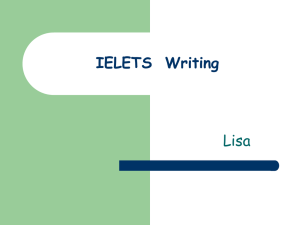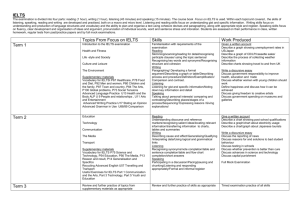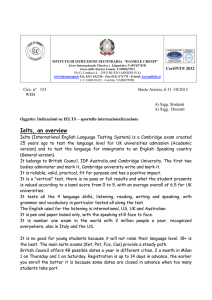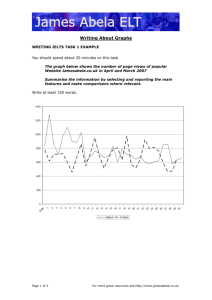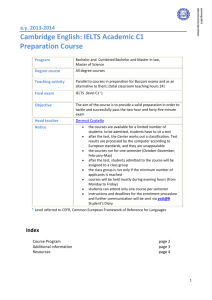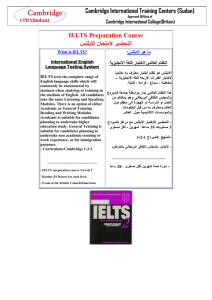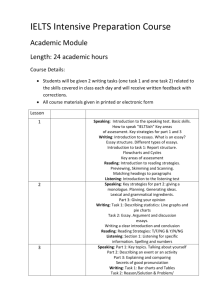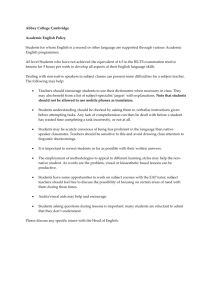Welcome to IELTS - information and objectives
advertisement
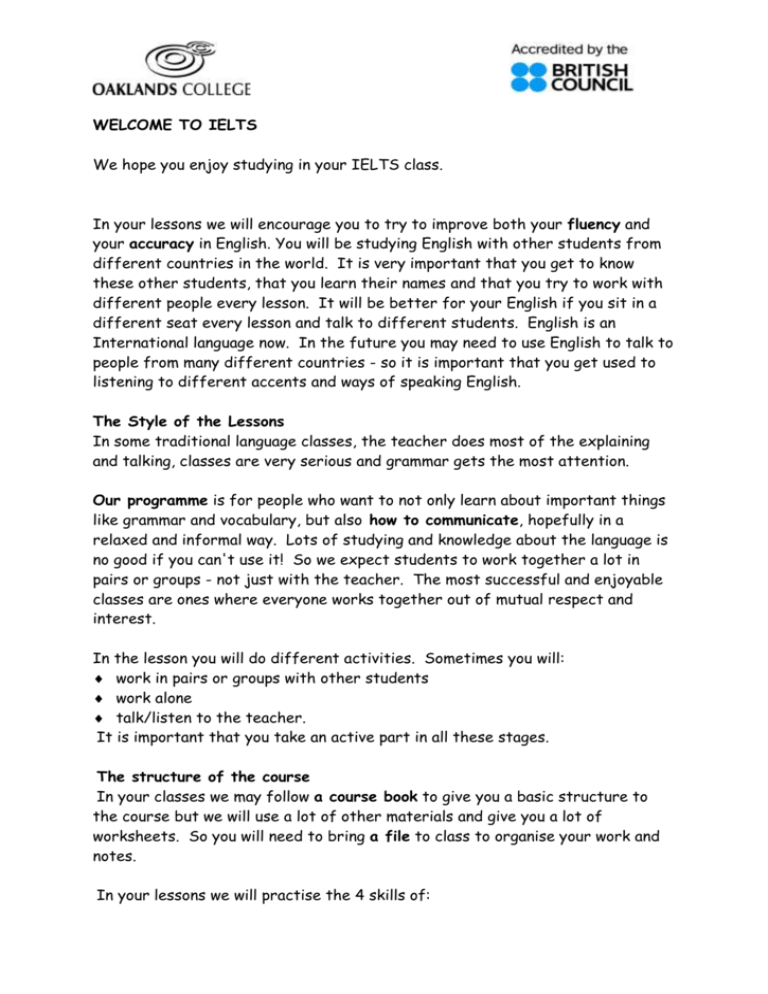
WELCOME TO IELTS We hope you enjoy studying in your IELTS class. In your lessons we will encourage you to try to improve both your fluency and your accuracy in English. You will be studying English with other students from different countries in the world. It is very important that you get to know these other students, that you learn their names and that you try to work with different people every lesson. It will be better for your English if you sit in a different seat every lesson and talk to different students. English is an International language now. In the future you may need to use English to talk to people from many different countries - so it is important that you get used to listening to different accents and ways of speaking English. The Style of the Lessons In some traditional language classes, the teacher does most of the explaining and talking, classes are very serious and grammar gets the most attention. Our programme is for people who want to not only learn about important things like grammar and vocabulary, but also how to communicate, hopefully in a relaxed and informal way. Lots of studying and knowledge about the language is no good if you can't use it! So we expect students to work together a lot in pairs or groups - not just with the teacher. The most successful and enjoyable classes are ones where everyone works together out of mutual respect and interest. In the lesson you will do different activities. Sometimes you will: work in pairs or groups with other students work alone talk/listen to the teacher. It is important that you take an active part in all these stages. The structure of the course In your classes we may follow a course book to give you a basic structure to the course but we will use a lot of other materials and give you a lot of worksheets. So you will need to bring a file to class to organise your work and notes. In your lessons we will practise the 4 skills of: speaking writing, reading, listening You will learn a lot of new vocabulary and expressions that you need to write down and to practise regularly. Sometimes in class you will be learning new things about English. But often you will be practising language that you have studied before but do not yet use well. In the middle of the Autumn and Spring terms you will have a progress test which will help to show you how your English is going. Attendance and punctuality This is important! You need to attend classes regularly. If you can't come to class it is best to ask another student to collect handouts for you and to tell you about any homework. Although everyone has commitments and occasional problems, good attendance means good punctuality too. Everyone (including your teacher!) is expected to be on time for classes! Students MUST attend regularly. If you miss 10% of your hours in class in a 2week period the College will expect a good reason for your absence. If there is no satisfactory explanation and attendance does not improve you will be given a final warning. Should attendance continue to be a problem, we will ask you to leave. In class We all get hungry sometimes during classes, but eating is not allowed in any class on the campus. Not only is it distracting, but it often results in a mess for the next class and even problems with insects. Homework You should expect to be given some homework after most classes. You don't need to do it, but you will make much faster progress if you do. If you don't do homework, you may find that some of the next lesson is wasted on you. You should expect to get your homework back no more than a week after giving it to your teacher. Exams Not everyone wants or needs to do an exam, but at the end of this level you should be ready to take the IELTS exam. These exams are normally taken in June if we have enough candidates. If we don’t, we can arrange for you to take the exam at another centre. What next? You can join one of our other part-time EFL programmes. You can always talk to your teacher about your progress and what programme would be suitable. WE HOPE YOU ENJOY YOUR COURSE Course Objectives IELTS Summary The IELTS class is intended for learners functioning at Band 4 and 5, and hopes to take them to Band 5 or 6 respectively so that they can access a university Foundation programme or a Level 3 course at a Further Education institution. The structural/functional/lexical syllabus is aimed at students who are at an Intermediate/Upper Intermediate level of English. Some learners will, however, be able to achieve much higher than this. Students will study once a week for 3 hours. They can do this part-time, part of the full time programme, or in combination with other part-time courses. Students can enrol termly or for the academic year. For a detailed overview of the exam and available materials, go to the Cambridge ESOL website http://www.cambridgeesol.org/exams/ielts/index.html Or the official IELTS site http://www.ielts.org/PDF/IELTS%20Guide%20for%20Teachers_British_FA%2 002_LR(v.2).pdf Listening and Reading Learners will be able to demonstrate a variety of listening and reading skills (skimming, scanning, interpreting tone and purpose etc.) in both social (e.g. asking for information at the Student Fayre) and more academic contexts (e.g. listening to an extract from a lecture) through the following tasks: Multiple choice Short answers Sentence completion Note/summary/flow chart/table/completion Label diagrams Classification Matching In addition learners will be able to interpret written information to determine whether a fact or opinion is true, false or not part of the text. The source for the skills practice will be: short and longer dialogues involving two or more speakers; short lecture formats. For reading skills journals, books, newspapers regarding general interest topics are used. Writing Learners will be able to organise, compare and present data in a short piece based on a visual; describe a process; describe an object or a series of events; explain how something works. Learners will also be able to present a solution to a problem; justify and opinion; compare and contrast opinions; evaluate ideas, in a more extended discursive piece. Speaking Learners will be able to manage a series of questions appropriate to personal exchanges; speak on a topic for a longer turn; participate in a discussion on a more abstract nature
